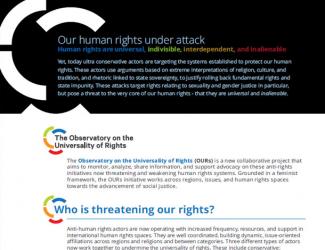Human rights are universal, indivisible, interdependent, and inalienable
Yet, today ultra conservative actors are targeting the systems established to protect our human rights. These actors use arguments based on extreme interpretations of religion, culture, and tradition, and rhetoric linked to state sovereignty, to justify rolling back fundamental rights and state impunity. These attacks target rights relating to sexuality and gender justice in particular, but pose a threat to the very core of our human rights - that they are universal and inalienable.
The Observatory on the Universality of Rights (OURs)
The Observatory on the Universality of Rights (OURs) is a new collaborative project that aims to monitor, analyze, share information, and support advocacy on these anti-rights initiatives now threatening and weakening human rights systems. Grounded in a feminist framework, the OURs initiative works across regions, issues, and human rights spaces towards the advancement of social justice.
Who is threatening our rights?
Anti-human rights actors are now operating with increased frequency, resources, and support in international human rights spaces. They are well coordinated, building dynamic, issue-oriented
affiliations across regions and religions and between categories. Three different types of actors now work together to undermine the universality of rights. These include conservative:
- State missions and blocs
- Civil society organizations, NGOs and other non-state actors
- Intergovernmental and religious bodies
What are their arguments?
Historically, anti-rights actors often completely rejected the validity of human rights frameworks.
However, there is a recent tendency to move away from this approach towards more subtle rhetoric which co-opts the language of rights. There has also been a move away from explicitly religious language and towards more ‘secularized’ discourses, including the use of conservative ‘social science’ as evidence. These misleading discourses go against universal human rights standards. Yet they are increasingly effective.
-
Protection of the family — a dangerous agenda lies behind the seemingly harmless title.
This rhetoric combines different anti-rights narratives: attempting to supercede individual family members’ rights with rights accorded to the institution of the family; promoting a unitary, patriarchal and heteronormative idea of ‘the family’; and undermining the rights of children, rights to non-discrimination, and protections against violence in family contexts. -
Right to life — regressive actors increasingly try to use the broader principle of the right to life to further their anti-abortion agenda, making the unsupported argument that life begins at conception, and that this interpretation of the right to life overrules reproductive rights.
-
Parental rights and rights of the child — language on the rights of children is manipulated to undermine children’s rights, protections, and autonomy. The aim of this discourse is to shift the focus away from internationally recognized children’s rights such as the right to education and freedom from abuse, and toward so-called parental rights, which are not recognized in international human rights law and which can easily be used to infringe on children’s rights.
-
National sovereignty and Western imperialism — States and non-state actors often cynically hide their regressive positions in arguments against Western imperialism or in defence of national sovereignty, using anti-imperialist language to strengthen their power.
Ironically, the vast majority of religious right CSOs active in the international sphere are based in North America and work to export hate worldwide. -
Religious freedom and cultural rights — anti-rights actors use references to religious freedom and culture in a way that directly contradicts the purpose of those rights. They reframe the right to religious freedom as a protection of beliefs rather than of believers. Culture is presented as monolithic and unchanging, where a singular ‘tradition’ limits the rights of women, children and minorities - ignoring the equal rights of all to participate in and shape culture.
What are some of their strategies?
- Training of UN delegates
- International and cross-regional convenings
- Reservations (e.g. to multilateral treaties), and delegitimization and defunding of the work of UN actors
- Development and promotion of a parallel ‘human rights’ framework
- Development and use of pseudo-scientific arguments or research using flawed methodologies
- Youth mobilization
- Online organizin
The impact on our human rights
Day by day, we are seeing the various ways in which these actors erode our rights. From the Protection of the Family resolutions now passed at the Human Rights Council (HRC); to push-back against the Women Human Rights Defenders framework and protections for civil society at the international level; removal of references to human rights, gender, and sexual and reproductive health and rights from Commission on the Status of Women Agreed Conclusions; reservations to Agenda 2030 by a number of states, stating they will only implement goals that are “in line with the cultural and religious values of its countries”; ongoing references by states to reservations which sidestep their CEDAW Convention obligations; and continued opposition to protections against marital rape and child, early, and forced marriage in the General Assembly and HRC - our rights related to gender and sexuality are under coordinated attack with real and ongoing impact.
